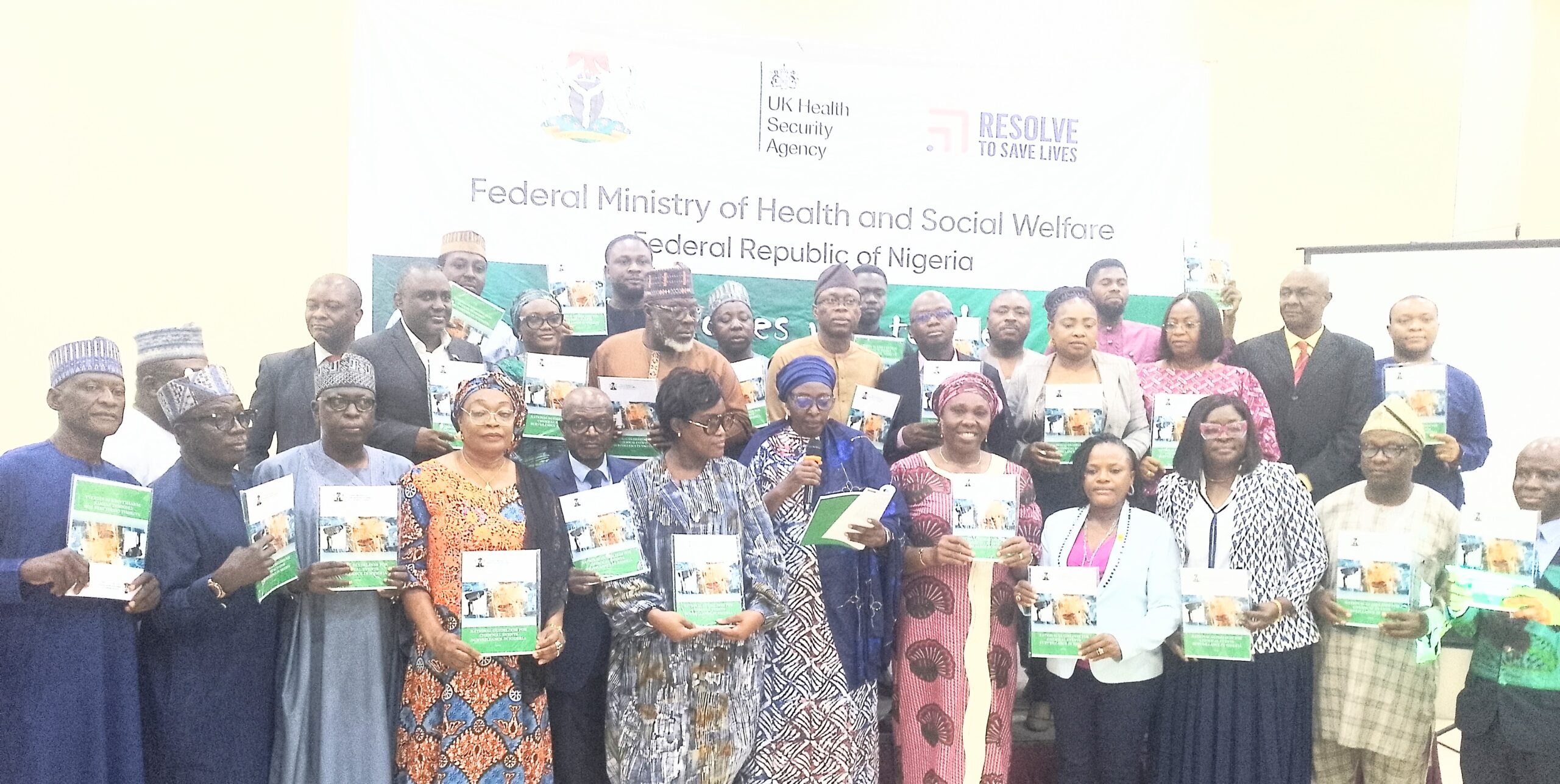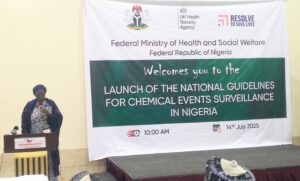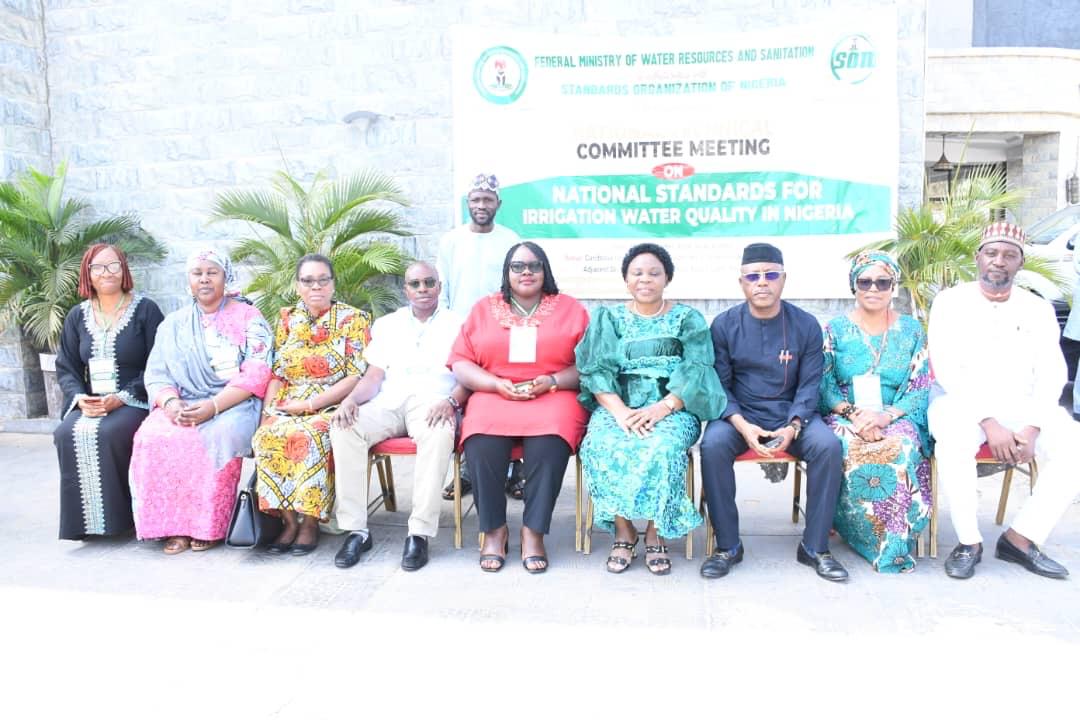
By Fatima Saka
The Federal Government of Nigeria has unveiled the National Guidelines for Chemical Events Surveillance to enhance the country’s preparedness, detection, response, and mitigation of chemical related public health risks.
The launching of the event was held in Abuja on Monday, which brought together representatives from key ministries, agencies, and development partners. The new guidelines are the result of robust stakeholder engagement, including input from federal and state MDAs, academia, and professional bodies, in marking a significant step toward the implementation of a One Health approach.
Speaking at the ceremony on behalf of the Coordinating Minister of Health and Social Welfare, Professor Muhammad Ali Pate, the Ministry’s Permanent Secretary, Daju Kachollom, said the guidelines were developed in response to increasing risks posed by the improper use, handling, transportation, and disposal of chemicals across Nigeria.

“This is a roadmap for protecting the health of Nigerians. We are saving lives. Without health, there is no life,” she stated, emphasizing the government’s commitment to strengthening chemical surveillance systems.
She further noted that the document aligns with international best practices and integrates with existing national systems such as the Integrated Disease Surveillance and Response (IDSR) and Surveillance Outbreak Response Management and Analysis System (SORMAS), enabling early detection and rapid response to chemical incidents.
In goodwill messages, stakeholders from other critical sectors emphasized the cross-cutting nature of chemical safety and pledged inter-ministerial collaboration for the effective implementation of the guidelines.
Representing the Minister of Environment, Balarabe Lawal, Mrs. Omotunde Adeola, Director of Pollution Control and Environmental Health, hailed the joint leadership of the Federal Ministries of Health and Environment in the National Committee on Chemical Event Surveillance.
“This launch is a milestone in safeguarding Nigerians from the harmful effects of hazardous chemicals. Our Ministry remains committed to strengthening regulatory frameworks and promoting sound chemical management in line with international environmental conventions,” she said.
Mrs. Adeola stressed the adverse health effects of chemical exposure, ranging from respiratory diseases and cancers to developmental delays, and called for vigilance in protecting environmental and public health.
Senator Abubakar Kyari, Minister of Agriculture and Food Security, represented by Mr. Danlami Aliyu, described the misuse of agricultural chemicals as “deeply troubling,” citing instances of food contamination.
He expressed the ministry’s strong support, noting that the guidelines align with the International Health Regulations (2005) and promote food safety and environmental sustainability.
On behalf of the Minister of Livestock Development, Dr. Samuel A. Anzaku reaffirmed the Ministry’s active participation in developing the guideline, stating: “This initiative is a turning point in our nation’s efforts to ensure animal health, food security, and environmental protection.
“These guidelines provide clear rules and integrated surveillance tools to support early warning, lab protocols, and intersectoral coordination,”he added.
Also, the Minister of Science, Innovation and Technology, who was represented by Mrs. Stella C. Igwilo, emphasized that chemical surveillance cannot succeed without investment in technology, data analytics, and scientific research.
“The guidelines encourage innovation by incorporating laboratory investigation procedures, digital data management, and real-time incident reporting systems that will support evidence-based interventions across sectors,” she stated.
Earlier in her welcome remarks, Pharm. (Mrs) Olubunmi Aribeana, Director of the Food and Drug Services Department, warmly welcomed participants on behalf of the Federal Ministry of Health and Social Welfare to the formal launch of the National Guidelines for Chemical Events Surveillance in Nigeria.
“Your presence here today underscores the collective importance we all place on chemical safety and surveillance in Nigeria. This event marks a historic milestone in our nation’s public health journey.”
Pharm. Aribeana emphasized that chemical events, whether accidental, occupational, or intentional, pose increasing risks to both human health and the environment. She explained that the newly launched guidelines provide a structured national framework for the early detection, monitoring, and coordinated response to chemical events.
“Today’s launch signifies our fulfillment of a key commitment under the International Health Regulations (IHR 2005). This strategic document offers Nigeria its first-ever national roadmap for addressing chemical events through timely surveillance, data-driven decision-making, and multi-sectoral collaboration.”
She highlighted that the development of the guidelines was the result of years of technical collaboration involving over 20 ministries, departments, agencies, research institutions, and international partners.
In appreciation, she acknowledged the invaluable technical and financial support of the UK Health Security Agency (UKHSA), Resolve to Save Lives, the National Committee on Chemical Surveillance, and emergency response systems.
Pharm. Aribeana reaffirmed the Department’s unwavering commitment to coordinating stakeholders, building capacity, and strengthening the nation’s chemical surveillance infrastructure.
“This launch is not an end, but a beginning. We hope these guidelines will serve as a blueprint to galvanize multi-sectoral action, enhance preparedness, and ultimately save lives,” she added.
The National Guidelines for Chemical Events Surveillance underscore the importance of inter-agency cooperation, evidence-based policy, and capacity building. Stakeholders agreed that chemical hazards know no boundaries and called for collective action in implementing the document.
READ ALSO: Tribute to Former President of Nigeria Muhammadu Buhari (1942–2025)
Supported by partners such as the United Kingdom Health Security Agency and Resolve to Save Lives, the initiative also builds on Nigeria’s commitment to global health and environmental obligations under treaties like the Basel, Rotterdam, Stockholm, and Minamata Conventions.
The Ministry of Health assured that implementation of the guideline would be followed with technical training and monitoring, urging states, agencies, and civil society to own the process and champion chemical safety nationwide.





